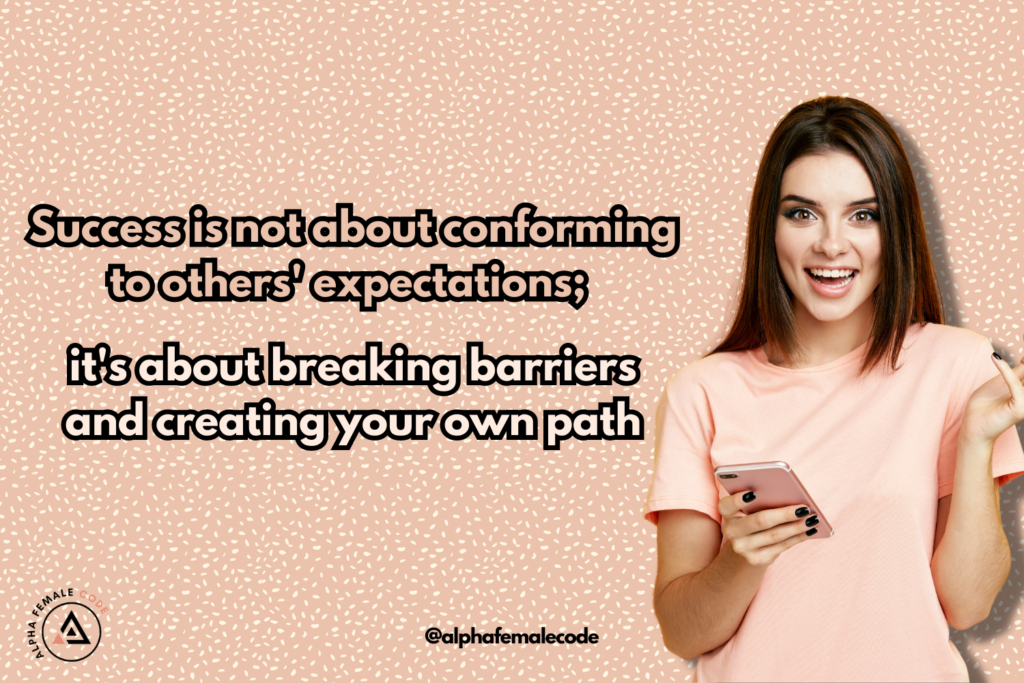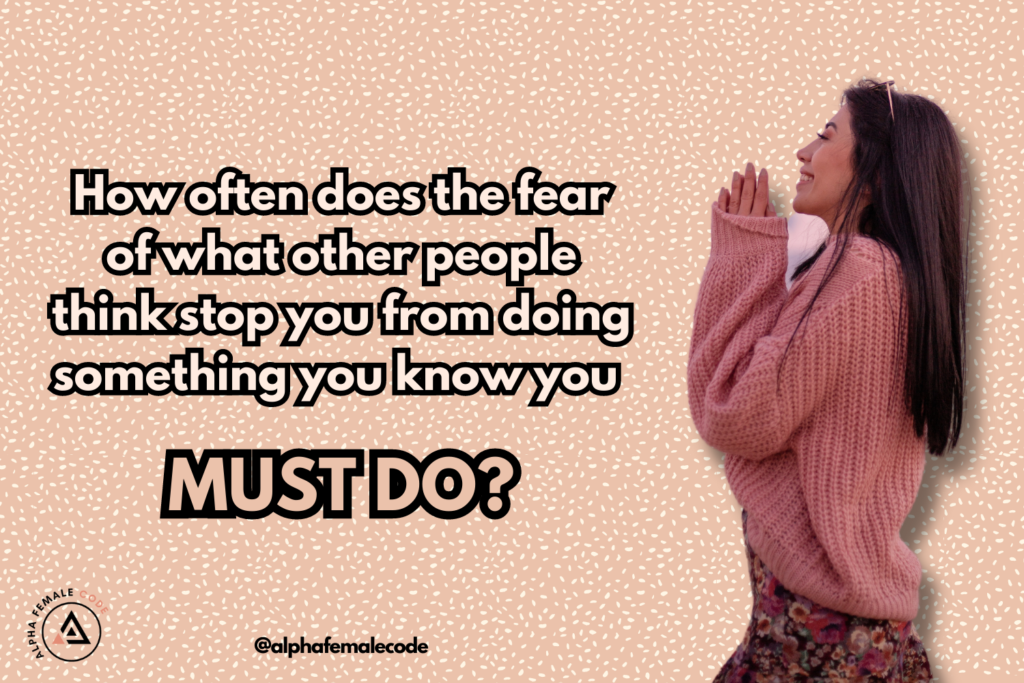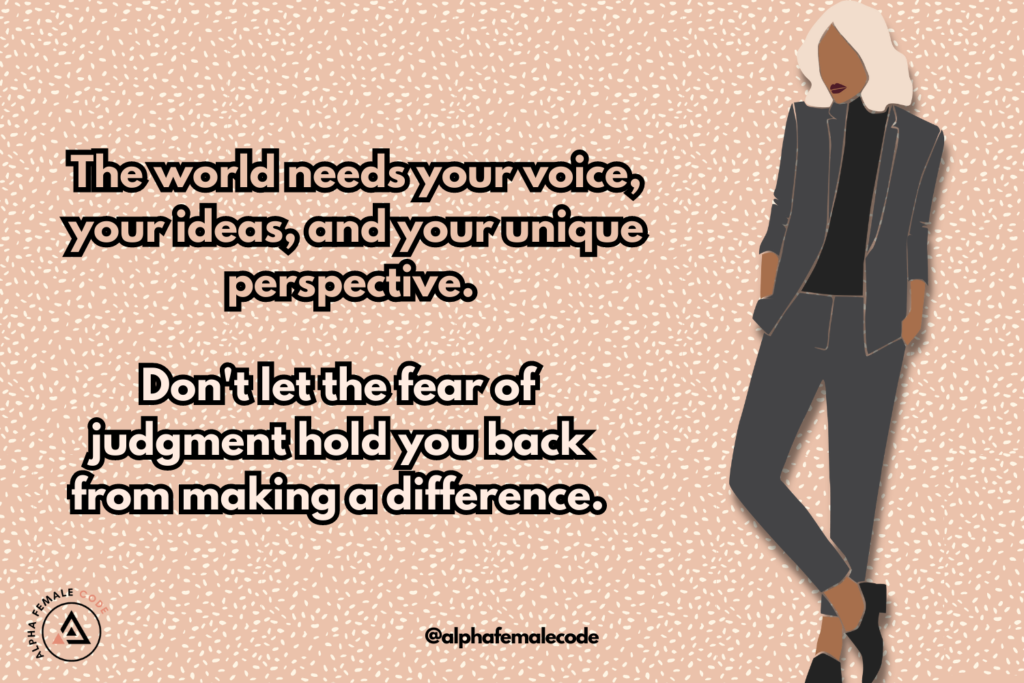
Do you often find yourself holding back from pursuing your dreams or trying something new because you’re afraid of being judged or criticized? You’re not alone. The fear of judgment is a common and natural emotion that affects many people. However, it’s important to remember that you don’t have to let this fear control your life.
In this blog post, we’ll be discussing practical and effective ways how to overcome the fear of judgment so that you can live the life you want without constantly worrying about what others think.
Disclaimer: This site contains affiliate links to products. We may receive a commission for purchases made through these links. Visit my disclaimer page for more information.
Why Do We Hate Being Judged?
Fear of judgment is deeply rooted in our ancestral past and is part of our evolutionary history. Humans have evolved to be social creatures, and being part of a group was necessary for survival. In order to be accepted by the group, humans needed to conform to certain social norms and behaviors. Deviating from those norms could result in rejection or even expulsion from the group, which could be dangerous in terms of survival.
This need for acceptance and fear of rejection is still present in modern society, even though the consequences are not as severe. However, the fear of judgment can still trigger the same physiological response as a threat to our survival, such as increased heart rate, sweating, and muscle tension.
Furthermore, research has shown that some fears and anxieties can be inherited through our genes, passed down from our ancestors. This means that some individuals may have a genetic predisposition to fear judgment, making them more likely to experience it.
What causes fear of judgment?
Fear of judgment can stem from a variety of factors, both internal and external. Here are some common causes of fear of judgment:
- Past experiences: If you have experienced negative feedback or criticism in the past, you may be more prone to fear judgment in the future.
- Perfectionism: If you have high standards for yourself and fear falling short, you may worry about being judged by others.
- Low self-esteem: If you don’t feel confident in yourself or your abilities, you may worry about what others think of you.
- Social comparison: If you constantly compare yourself to others and feel like you don’t measure up, you may worry about being judged by them.
- Cultural or societal expectations: Depending on your culture or societal norms, there may be certain expectations or standards you feel you need to meet in order to avoid judgment.
- Fear of rejection: If you fear being rejected or excluded by others, you may worry about being judged by them.

Why do women suffer from fear of judgment more than me?
It’s important to note that these causes are not exclusive to female entrepreneurs and can also be experienced by men. However, women may face additional challenges due to gender biases and societal expectations.
Understanding the potential causes of fear of judgment can help female entrepreneurs address these issues and develop strategies to overcome them.
- Gender stereotypes: Women may face stereotypes or biases in business that can lead to feelings of self-doubt and fear of judgment. For example, there may be a belief that women are not as competent or knowledgeable in business as men, leading to a fear of being judged as inadequate.
- Lack of representation: Women are still underrepresented in many fields, including entrepreneurship, which can lead to a sense of isolation and a fear of being judged by their male peers or potential investors.
- Double standards: Women may feel pressure to balance their business success with traditional gender roles, such as being a caregiver or homemaker. This can lead to feelings of guilt or shame if they perceive that they are not meeting societal expectations.
- Fear of failure: Starting a business is a risky endeavor, and women may feel added pressure to succeed due to the perception that they have more to prove in a male-dominated field. The fear of failure and being judged as unsuccessful can be a significant source of anxiety.
- Imposter syndrome: Many women experience imposter syndrome, the feeling that they are not qualified or deserving of their success. This can lead to a fear of being judged as a fraud or impostor.

Related posts:
How to never dim your light again (especially for others)
How to get out of your own way and stop sabotaging yourself.
How to stop caring about what others think?
How to prove people wrong and do the impossible?
Tips to overcome the fear of judgment.
1. You’re the VIP of your life: Don’t invite judgment!
You have the power to define your own success and happiness, and the opinions of others should not dictate your choices or your self-worth.
When you invite judgment, you are giving others the power to control your life and your emotions. This can lead to feelings of anxiety, self-doubt, and even shame. Instead, focus on your own goals and values, and trust in your own abilities and decisions.
Of course, it’s not always easy to ignore the judgments of others, especially when they come from people we care about or respect. However, by recognizing that you are the VIP of your own life, you can begin to develop a stronger sense of self and a greater resilience to external criticism.
So, the next time you feel the fear of judgment creeping in, remind yourself that you are in charge of your own life and that your choices and opinions matter. Don’t invite judgment – instead, embrace your own unique journey and celebrate your successes, big and small.
2. Be your own cheerleader: Stop judging yourself!
Are you tired of doubting yourself and comparing yourself to others? As a boss babe or female entrepreneur, you have what it takes to achieve great things. It’s time to become your own cheerleader and put a stop to the self-judgment that’s been holding you back!
Start by changing the way you talk to yourself. Focus on your strengths and accomplishments, and celebrate your wins. Stop comparing yourself to others and embrace your individuality.
Surround yourself with positive, supportive people who will encourage you and lift you up. And most importantly, practice self-care and give yourself a break. You deserve it!
3. Approval not required: Stop chasing people’s approval!
Do you find yourself constantly seeking the approval of others? Are you afraid to make a decision or take action without someone else’s permission or validation? It’s time to break free from the need for external approval and start living life on your own terms.
First, let’s acknowledge that seeking approval from others is a natural human tendency. We all want to be accepted and loved by those around us. But when this need becomes a constant pursuit, it can be harmful to our mental and emotional well-being.
So how do you break free from this cycle? Start by recognizing that your worth does not depend on the approval of others. You are inherently valuable and deserving of love and respect, regardless of what anyone else may think or say.
Next, focus on your own internal guidance system. Trust your instincts and make decisions based on what feels right for you, not what you think others want or expect from you. Remember that you are the only one who truly knows what is best for you and your life.

4. Love is all around: Surround yourself with love!
When we surround ourselves with love, we create a nurturing and supportive environment that helps us to feel safe, valued, and confident.
So how do we surround ourselves with love? It starts by cultivating self-love and self-compassion. When we love ourselves, we are better able to attract and receive love from others. Practice self-care and prioritize activities that make you feel good about yourself, whether it’s taking a relaxing bath, going for a walk in nature, or spending time with friends who uplift you.
Next, seek out relationships that are based on love and respect. Surround yourself with people who make you feel good about yourself and who support your dreams and aspirations. Avoid toxic relationships that drain your energy and make you feel bad about yourself.
And don’t forget to give love freely and generously to those around you. Spread kindness and positivity wherever you go, and you will attract love and kindness in return.
5. Judgment is universal: Accept that everyone is judged at some point!
Let’s face it, no matter who you are or what you do, you will face judgment at some point in your life. Whether it’s from family, friends, colleagues, or even strangers, we are all subject to the opinions and perceptions of others.
So how do we deal with this reality? The first step is to accept that judgment is a universal experience. You are not alone in feeling judged or criticized, and it’s important to remember that other people’s judgments say more about them than they do about you.
Next, try to shift your perspective on judgment. Instead of seeing it as something negative or hurtful, view it as an opportunity for growth and learning. Ask yourself, “What can I learn from this feedback?” or “Is there any truth to what they’re saying, and how can I use this to improve myself?”
Finally, focus on building your own sense of self-worth and self-esteem. When you feel confident and secure in who you are, the opinions of others will have less power over you.
6. Your worst critic: We often judge ourselves more harshly than others do!
It’s often said that we are our own worst critics, and there’s some truth to that. We tend to be harder on ourselves than we are on others, and we can be quick to judge ourselves for our mistakes or shortcomings.
But why is this the case? One reason is that we are intimately aware of our own flaws and insecurities. We know our weaknesses and vulnerabilities better than anyone else, and this can make us more critical of ourselves.
Another reason is that we often compare ourselves to others. We see their highlight reels on social media and assume that they have it all together, while we’re struggling to keep up. This comparison game can lead to feelings of inadequacy and self-doubt.
So what can we do to overcome this tendency to judge ourselves harshly? One strategy is to practice self-compassion. Treat yourself with the same kindness and understanding that you would show to a friend who is going through a tough time. Recognize that making mistakes and experiencing setbacks is a natural part of the human experience, and give yourself permission to be imperfect.
Another strategy is to challenge your negative self-talk. When you catch yourself engaging in self-criticism, ask yourself if what you’re saying is really true. Would you say these things to a friend? If not, why are you saying them to yourself?
7. Know thyself: Acknowledge your strengths and understand your limits!
One of the keys to overcoming the fear of judgment is to know yourself well. This means taking the time to acknowledge your strengths, understand your limits, and develop a strong sense of self-awareness.
Knowing your strengths is important because it allows you to focus on what you’re good at and what you enjoy. When you’re doing something you’re good at, you’re more likely to feel confident and empowered. This confidence can help you overcome the fear of judgment and allow you to pursue your goals with greater enthusiasm.
8. It’s not about you: People are incredibly self-centered!
Understanding that people are self-centered can be a powerful tool for overcoming the fear of judgment. When you realize that most people are more concerned with their own lives and problems than with judging you, it can help put things into perspective. You can learn to let go of the fear of being judged and focus on your own goals and priorities.
It’s important to remember that everyone has their own struggles and challenges. People may judge you for things that have nothing to do with you, but rather reflect their own fears, insecurities, and biases. This doesn’t mean that you shouldn’t take responsibility for your actions or strive to improve yourself, but it does mean that you shouldn’t take others’ judgments too personally.
One way to shift your perspective is to practice empathy. Put yourself in the other person’s shoes and try to understand where they’re coming from. This can help you see things from a different perspective and reduce the impact of their judgments.
9. Pen your way out: When in doubt, journal it out!
Journaling can be a powerful tool for overcoming the fear of judgment. When you’re feeling overwhelmed or uncertain, putting pen to paper can help you process your thoughts and emotions in a safe and private way. Journaling can also help you identify patterns and triggers that contribute to your fear of judgment, allowing you to develop strategies for managing it.
One of the benefits of journaling is that it allows you to explore your feelings and experiences without fear of judgment or reprisal. You can write honestly and openly, expressing your thoughts and emotions without worrying about how others will react. This can be a liberating experience, allowing you to gain clarity and perspective on the challenges you’re facing.
Another benefit of journaling is that it can help you identify and challenge negative self-talk. When you write down your thoughts and beliefs, you may notice patterns of self-criticism or self-doubt. By acknowledging and challenging these negative patterns, you can develop a more positive and self-affirming mindset.
When you’re feeling overwhelmed or stuck, try setting aside a few minutes each day to journal. Write down your thoughts and feelings, and try to identify any patterns or triggers that contribute to your fear of judgment. You may find that journaling helps you gain clarity and perspective on your challenges, and gives you the courage and confidence to overcome them.
10. This too shall pass: Nothing lasts forever!
When you’re experiencing the fear of judgment, it can feel like the world is closing in on you. The fear can be overwhelming, and it may seem like it will never go away. But the truth is, nothing lasts forever. Whatever you’re going through, it will pass.
This is an important reminder to keep in mind when you’re feeling stuck or overwhelmed by the fear of judgment. It can be easy to get caught up in the moment and believe that things will never get better. But the truth is, time heals all wounds. Even the most difficult challenges eventually pass, and you will emerge stronger and wiser on the other side.

11. It’s not always you: Know that it might be them, not you!
When we’re worried about being judged by others, it’s easy to assume that we’re the problem. We might think that there’s something inherently wrong with us that’s causing others to judge us negatively. But the truth is, sometimes it’s not about us at all. It might be that the other person has their own issues and insecurities that are causing them to judge us unfairly.
It’s important to remember that everyone has their own biases and perspectives. What one person might judge as a flaw, another might see as a strength. And sometimes, people are just having a bad day or dealing with their own issues that have nothing to do with us.
12. Let them talk: Let them judge!
As much as we might try to avoid it, there will always be people who judge us and talk behind our backs. It can be tempting to get caught up in trying to defend ourselves or change their minds, but the truth is that we can’t control what other people think or say about us.
Rather than wasting our energy trying to please everyone and avoid judgment, it’s important to focus on our own values and goals. We should strive to be the best version of ourselves and let others think and say what they will.
Of course, this doesn’t mean that we should ignore or dismiss all criticism. It’s important to be open to feedback and willing to make improvements. But we should also be discerning about whose opinions we value and consider. Not everyone’s judgment carries the same weight or credibility.
13. Perfectly imperfect: Accept that you’re human and not perfect!
In today’s society, there is often a lot of pressure to be perfect. We see images of flawless models and celebrities on social media and in advertisements, and it’s easy to start comparing ourselves and feeling like we don’t measure up.
The truth is, nobody is perfect. We all have flaws and make mistakes. It’s important to accept this and to embrace our imperfections, rather than trying to hide or fix them.
When we try to be perfect, we often set ourselves up for failure and disappointment. We become so focused on avoiding mistakes or looking flawless that we forget to enjoy the process and the journey of learning and growing.
Embracing our imperfections allows us to be more authentic and genuine, and it can even be empowering. When we accept our flaws and mistakes, we can learn from them and use them as opportunities to improve and become better versions of ourselves.
It’s important to remember that being imperfect doesn’t make us any less valuable or worthy. We all have unique strengths and qualities that make us who we are, and it’s these differences that make the world a more interesting and diverse place.
14. Define yourself: Resist letting others define you!
It’s easy to fall into the trap of letting others define us. Whether it’s through social media, advertising, or the opinions of others, we can start to feel like we need to fit into a certain mould or live up to certain expectations.
But the truth is, nobody knows you better than yourself. Only you can truly define who you are, what you stand for, and what you want out of life.
Resisting the urge to let others define you can be a liberating and empowering experience. It allows you to stay true to yourself and your values, rather than constantly trying to please others or fit into their expectations.
Defining yourself starts with understanding who you are and what you want. Take time to reflect on your values, interests, and passions, and use these as a foundation for defining your identity.
It’s also important to remember that your identity is not static. Don’t let past mistakes or failures define you, and instead use them as opportunities to grow and learn.
15. Boss up: Do more of what empowers you!
As a boss babe or female entrepreneur, you know what it takes to succeed. It takes hard work, dedication, and a willingness to take risks. But one thing that can sometimes hold us back is the fear of failure or the fear of what others might think.
That’s why it’s so important to do more of what empowers you. This means focusing on the things that make you feel strong, confident, and capable.
Identify what those things are. What are your strengths? What are the things that light you up and make you feel alive?
16. Mental game on point: Prepare yourself mentally!
Dealing with the fear of judgment requires mental preparation, just like any other challenge you face in life.
One key way to prepare yourself mentally is to imagine the criticism you fear actually happening and to think through how you would deal with it in a constructive and healthy way. This exercise helps you build mental resilience and prepares you to face any judgment that comes your way.
When imagining the worst-case scenario, it’s important to be realistic but also optimistic. Instead of just focusing on the negative aspects, try to identify potential solutions or ways to improve based on the feedback you receive. This can help you turn a negative experience into a learning opportunity.
17. Baby steps: Take small actions toward overcoming your fear of judgment!
Taking small, incremental steps is a great way to overcome your fear of judgment. It can be overwhelming to try and tackle all your fears at once, so it’s important to break things down into manageable chunks.
One way to take small actions toward overcoming your fear of judgment is to start by identifying one specific fear that you have and brainstorming some small actions you can take to address it. For example, if you’re afraid of speaking up in a group setting, you could start by sharing your opinion with one person, and then gradually work your way up to sharing it with a larger group.
Conclusion
Overcoming the fear of judgment is not an easy process, but it’s definitely worth the effort. By using the tips we’ve discussed in this blog post, such as being your own cheerleader, surrounding yourself with love, and taking baby steps toward your goals, you can gradually learn to let go of your fear and live a more fulfilling life. Remember, it’s okay to make mistakes and be imperfect. What matters is that you keep moving forward and never give up on yourself. So go ahead and take that first step towards overcoming your fear of judgment – you’ve got this!
